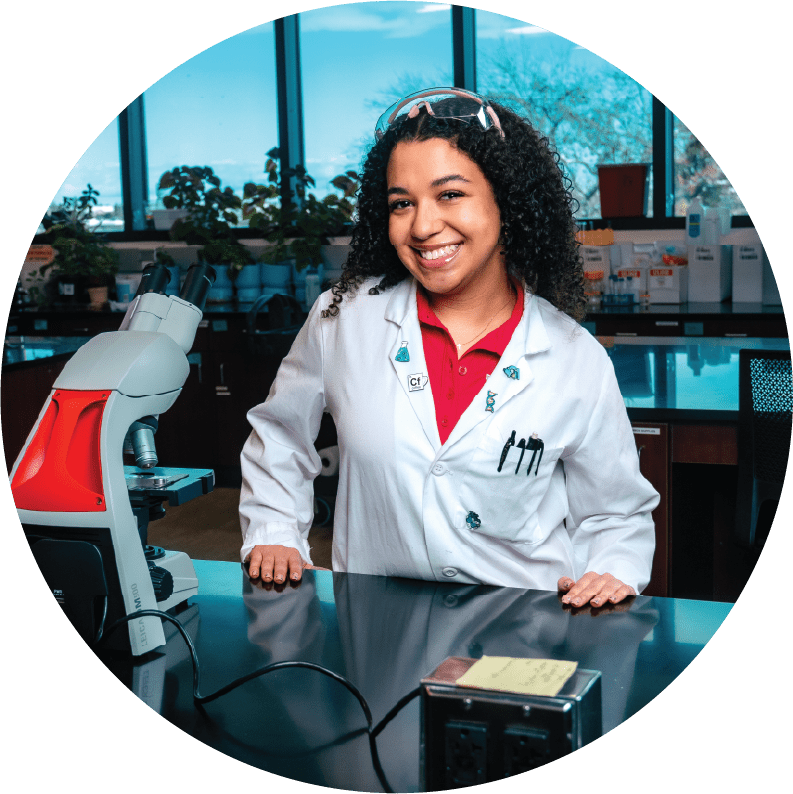Forensic Degrees
Accounting, Biological and Psychological Investigation

Tell Us About Yourself
Featured Program: Forensic Psychology
Learn how psychology connects with the law to understand human behavior. Build research and communication skills to prepare for careers in law enforcement, investigations or mental health — or for graduate study in related fields.
Explore Our Forensic Programs
With financial crimes on the rise and the overall business environment becoming increasingly more complex, the need for skilled professionals trained to detect and prevent fraud continues to grow.
Forensic accounting pairs financial acumen with forensic investigation to provide insight into legal and fiscal investigations. Forensic accountants apply their expertise in accounting, auditing and reporting to recognize and document fraudulent evidence for civil and criminal cases.
Embry-Riddle's B.S. in Forensic Accounting & Fraud Examination is among the fastest-growing programs across the residential campuses and is one of the few programs that focus on forensic accounting in the nation. Our expert faculty with vast industry experience prepare students for success in law, investigation, fraud prevention, deterrence and more.
Forensic biology applies scientific techniques to the collection, documentation and presentation of biological evidence in criminal investigations. Forensic scientists work with criminal investigators, lawyers and judicial institutions to solve crimes and bring criminals to justice.
The B.S. in Forensic Biology provides students with a foundation in biology, chemistry and law, with coursework that aligns with the American Board of Criminalistics (ABC) certification. Instructive laboratory components and access to forensic techniques prepare graduates for careers in local and state crime labs, private forensic labs, medical examiners’ offices, the FBI or even the Armed Forces DNA Identification Lab, to name a few.
Forensic psychologists apply psychological principles about criminal behavior to better understand a suspect's motive and solve complex criminal cases. Forensic psychology is the combination of psychological training with forensic science within the U.S. legal system.
Students of the B.S. in Forensic Psychology program receive faculty-led instruction in areas of evidence collection, psychological assessment, crime scene investigation, counseling and victim advocacy. Curriculum offers opportunities to mentor juvenile offenders, volunteer with local justice systems, conduct hands-on research and network with industry professionals at scientific conferences.
Students can participate in the Cold Case Task Force, in which Embry‑Riddle partners with local law enforcement agencies to help investigate cold cases. Forensic Psychology students can contribute to these investigations as part of their capstone.
Graduates are quality candidates for the pursuit of postgraduate study in graduate-level and doctoral programs.
Key Benefits
We've Got Labs
At Embry-Riddle, you’ll receive more hands-on lab work than most undergraduate students experience at competing institutions, preparing you for your career or graduate school aspirations.
Industry Focused
Curriculum is designed toward success in your chosen field of forensics. Whether it’s accounting, biology or psychology, our courses give you practical knowledge in forensic principles.
Hard-Science Background
Our students receive a hard-science background in forensic investigation and evidence gathering, instilling fundamental investigatory skills into our graduates that translate into success in the field.
Program Highlights
Prepare for Accreditation
Course curriculum is modeled to match the industry needs for forensic scientists, preparing students for seamless accreditation after graduation.
Diverse Employment Options
The programs qualify graduates for diverse industry employment in areas related to law, research, biotech, pharmaceutical, healthcare, government, aviation, bio-labs and many more.
Exciting Internship Opportunities
Students have the option of exploring internships with major government intelligence agencies like the FBI, CIA, OSI and more.
Program Outcomes
Embry-Riddle has the faculty, laboratories and industry connections to get you to where you want to go in your future career. Whether you are drawn to working in a crime lab, examining white-collar fraud or entering law enforcement as a criminal detective, an undergraduate degree in one of our programs can put you on course for your career in forensics.
Our forensic programs are also foundational for students looking to expand their knowledge at graduate schools. Thanks to our small class sizes, one-on-one instruction with faculty and hands-on opportunities for experiential learning, undergraduates are well-positioned for success while pursuing their master’s degrees and often have more research and lab experience than their peers from competing universities.
Accounting
- Forensic Accountant
- Certified Fraud Examiner
- FBI Agent
Biology
- Crime Scene Investigator
- Forensic Chemist
- Forensic Biologist
Psychology
- Criminal Investigator
- Lawyer
- Detective
Scholarships & Aid
Did you know that 94% of Embry-Riddle freshmen receive some form of financial aid through scholarships, grants and loans? Scholarship applications are open to all students who qualify.
When it comes to educational funding, you have options at Embry-Riddle. Don’t let the cost of attending deter you from advancing your education and your career.
Our dedicated counselors can advise you on ways to help finance your future and focus on your studies. You can be assured an investment in Embry-Riddle is a wise one.
By thE Numbers
- 1926 The year Embry-Riddle was founded. .
- 100+ Degrees to choose from. .
- 95% Employed or continuing education within a year of graduation. .
- 160,000 Alumni around the world. .


